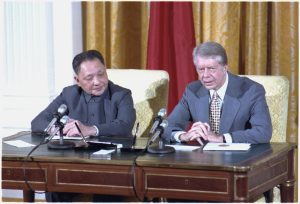Stephen Orlins

As former U.S. President Jimmy Carter enters his final days, those of us who follow China remember the brave and politically risky decision he made in 1978.
At the time, the United States still felt the effects of four decades of war in Asia that killed hundreds of thousands of American soldiers. China had just emerged from a radical leftist period known as the Cultural Revolution that targeted the U.S. as enemy No. 1, and its new leader, Deng Xiaoping, was unproven.
Carter’s decision to establish diplomatic relations with China is widely recognized for laying the foundation for global economic growth in the years since. But it should be appreciated even more for keeping peace in the Asia-Pacific for more than 40 years.
Carter acted despite significant domestic opposition on both sides of the Pacific. I will never forget accompanying my boss, Herb Hansell, then the legal advisor of the State Department, to testify before the Senate Foreign Relations Committee. I sat behind Hansell as Senator Jesse Helms and others excoriated him for the notion of working with China. Hansell ably defended the decision, and history has more than proven Carter right. America, China, and Taiwan have prospered during this period and the world has benefited to an incalculable degree.
The lessons for today’s leaders are clear. Domestic opposition should not prevent the president from acting in the long-term interests of the United States. Establishing diplomatic relations did not solve all the problems in China-U.S. relations, and ties are tense again today, for multiple reasons. But there is no question that Carter’s decision put both countries on a path to improve the lives of their citizens.
Today, President Joe Biden can show leadership in a way that improves the political, economic and social progress in each country, without sacrificing legitimate national security concerns and strategic interests. Americans doubt the intentions of the Chinese government, but the United States should still work with China in areas that are mutually beneficial.
First policy steps are obvious: Cutting excessive tariffs that were put in place during the previous administration and punish lower income Americans; reopening diplomatic consulates in Houston and Chengdu; ending visa restrictions on each other’s citizens.
Even more important, we should arrive at an agreement on trade and investment restrictions necessary to protect each country’s national security and data flow across international boundaries; we should reestablish military-to-military contacts at senior and operational levels to prevent accidental conflict; and we should restart cooperation between the American and Chinese scientific communities to prevent the next pandemic. We should absolutely coordinate efforts on climate change.
As president of the National Committee on U.S.-China relations, I see great danger in slipping into a cold war. I think we should be honest about the temptation to heap blame on other countries when we face seriously challenging problems at home. In 1979, Carter recognized that China’s human rights record did not meet the standards to which he aspired. Deng Xiaoping understood that compromise and diplomatic relations with the United States was better for the Chinese people than continued isolation. Both sides saw the advantage of a communique that outlined special handling for Taiwan, while Washington moved diplomatic recognition to China and away from Taiwan.
While Carter’s achievements were extraordinary, his methods were ordinary. Carter’s envoy, Ambassador Leonard Woodcock, met regularly with his counterparts in China. Through those meetings, Carter and Deng found solutions to seemingly intractable problems.
I proudly stood on the White House lawn watching Carter welcome Deng for his landmark visit in January 1979, followed by a U.S. tour. After decades of hostility, Carter and Deng achieved a breakthrough that benefited the people of both countries.
Biden and Chinese President Xi Jinping should learn from this lesson and create a China-U.S. relationship that preserves peace and generates prosperity for the peoples of both the United States and China. History proves that it is the right path.
No comments:
Post a Comment